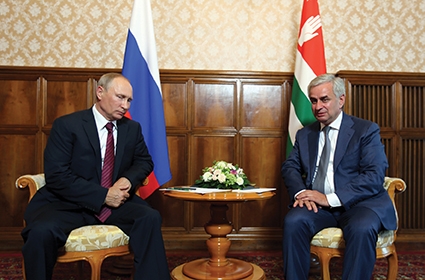Another Round of Abkhaz Instability
At the beginning of 2018, the Russian-controlled Georgian region of Abkhazia was hit by a new round of political crisis. The opposition in Abkhazia demands the resignation of the current “president,” Raul Khajimba. On December 25, 2017, Khajimba released from prison Giorgi Lukava, an ethnic Georgian. Lukava was arrested by the Abkhaz side seven years ago and had been given a 20-year prison sentence for alleged attacks against various Abkhaz separatist leaders while he was a member of the now-disbanded Georgian partisan military group Forest Brothers.
Abkhaz security forces tried to explain that Lukava’s release was part of a tripartite prisoner exchange process, initiated “in response to the request of the authorities of the Republic of South Ossetia,” with its major phase taking place in March 2016.
This did not, however, forestall the mounting crisis in the breakaway region. The Amtsakhara party (which, in fact, supported the ousted president, Alexander Ankvab) called a political council meeting on January 2 and announced a rally in front of the building of the “presidential administration” on January 3. Later on, the Abkaz opposition parties created a union of various entities with the aim of ending Khajimba’s rule. “Our purpose is to create a situation where the head of state voluntarily steps down,” members of “the union of political parties and public organizations of Abkhazia” said during the new entity’s first press conference on January 23.
Abkhazia is no stranger to intermittent political crises. Khajimba himself came to power on a wave of widespread protests. Since his election, Khajimba has experienced much political turmoil and numerous street demonstrations from the opposition. In mid-2017, the opposition forces in Abkhazia mounted a full-scale campaign against Khajimba’s government and began asking for his resignation. This not to say that the development is in itself a new one, but rather it comes on top of an already fragile internal situation and the official understanding between the separatist government and the opposition force Amtsakhara.
Abkhazia faces several fundamental problems which make stability in the breakaway region very unlikely. Unemployment is high and this in turn facilitates high levels of crime. One Russian tourist was killed several days ago in Abkhazia, even causing the Russian government to warn its citizens to take care when travelling to the breakaway region.
Abkhazia lacks internal stability because the ruling politicians often lack money and experience to effectively manage the region, while the opposition forces are strong enough to stage manifestations and even cause resignations. An example of the complicated situation is the recent return of Ankvab to Abkhazia. Khajimba’s government, fearful of the reaction and not being strong enough, could not prevent his election to PM.
Without doubt, Moscow oversees all major processes unfolding in Abkhazia. In an earlier article for GEORGIA TODAY, T I laid out those geopolitical imperatives which drive Russia’s stance on the region. Here, it would be fair to mention only some of them for the general context. For Moscow, Abkhazia is one of three major routes through which Moscow can physically enter the South Caucasus region. Russia has consistently dominated those three access points over several centuries and, when threatened with western encroachment, it has been open to using military force, just as it did in 2008 when there was a real possibility of Georgia moving closer to NATO or, more generally, to the EU.
The control of the Abkhazian route allows Russia not only to quickly deploy its forces in the breakaway region but, in case of urgency, to also threaten Georgia’s entire Black Sea coast. That is what happened in 2008 when Russian forces entered Poti and other Black Sea locations. Moscow understands that without control over Abkhazia, it would have been shut off from processes in the South Caucasus. Thus, this projection of military power serves the basis of Moscow’s foreign policy whereby NATO powers are quite hesitant to engage Moscow directly.
Considering that, one can only wonder how watchful the Russian officials are of events in Abkhazia. The Russians would also support the perennial instability of Abkhazia in order to avoid any kind of powerful Abkhaz nationalistic opposition to Russian influence.
Emil Avdaliani












